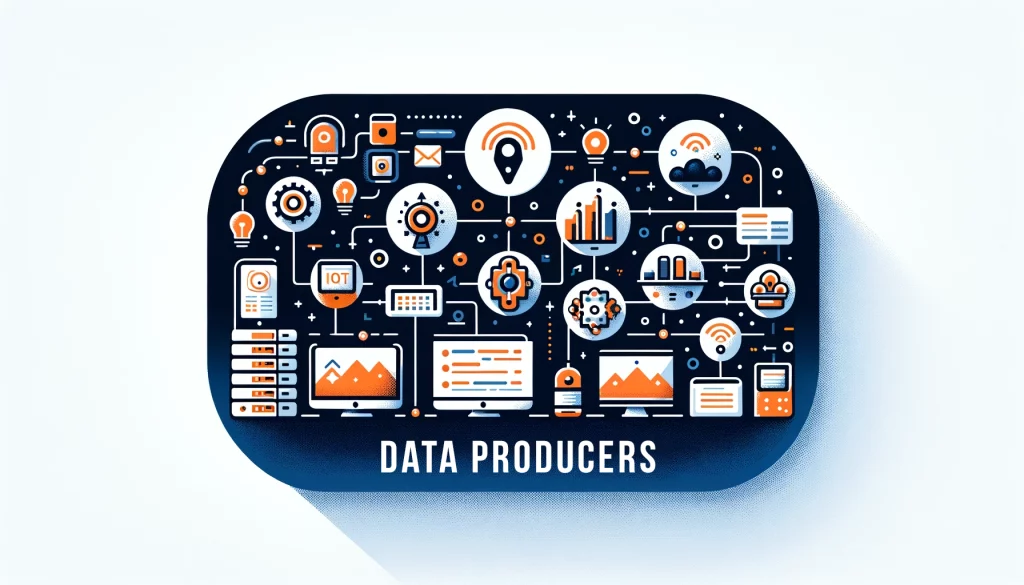
Data Producer

In today’s data-driven world, companies and organizations rely heavily on data to make informed business decisions. However, managing data assets can be a complex and time-consuming task. This is where the concept of data producer comes into play. In this article, we’ll explore their importance in data management and the challenges they face.
What is a Data Producer?
A data producer is an entity that generates or collects data. It can be a user interface, automation system, service, or device. In an organization, data producers are the root source of data. For example, consider a website that collects customer information or a system that processes transactions as data producers.
Data Producer vs. Data Consumer
In the context of data engineering, organizations often divide into two camps: data producers and data consumers. While producers generate data, data consumers use that data for various purposes, such as analytics and reporting.
Interestingly, some systems can be both producers and consumers simultaneously. For instance, a marketing system may receive customer data from a sales system, even though an e-commerce system is the actual producer of that data. This highlights the importance of understanding the flow of data within an organization.
The Challenges of Data Bloating
As organizations produce more data, they may face the challenge of data bloating. This occurs when data producers’ systems have growing data repositories filled with duplicate files, resulting in neither scalable nor flexible data. In such cases, producer systems become detached from the downstream uses of the data in analytics and reporting.
Consequently, it becomes the responsibility of the consumer teams to make sense of the data, make it usable, and attempt to clean it up when issues arise. This approach is inefficient, especially with the advent of an increased volume of data, including streaming data, big data, unstructured data, and data from IoT devices.
Holding Data Producer Accountable
To address the challenges of data bloating and ensure data quality, it has become essential to hold data producers accountable. This means making them responsible for both making their data available to downstream teams and ensuring its quality in the process.
One way to achieve this is by establishing agreements between data producers and data consumers teams. These agreements, known as producer contracts, outline the roles and responsibilities of each team. Some key aspects of these contracts include:
- Recency/Timeliness: Establishing the time it takes for data repositories to produce and make data available is crucial
- Data Growth: Considering the size and volume of the data and communicating expectations for future storage capacity.
- Communication Management: Establishing agreements on how to communicate issues with data quality to stakeholders is essential.
- Sensitive Data Treatment: Establishing rules for dealing with sensitive data, such as personally identifiable information, and accommodating data protection regulations.
- Data Catalogs: Ensuring data producers provide metadata on data assets to users so that stakeholders can adequately understand them.
- Schemas: Establishing agreements on shared data type schemas to ensure the data system can be centrally managed and scaled.
Examples of Data Producer
To better understanding, let’s look at some examples:
- E-commerce Websites: When a customer makes a purchase on an e-commerce website, the website becomes a data producer. It generates data such as customer information, purchase history, and product details.
- Social Media Platforms: Social media platforms like Facebook, Twitter, and Instagram are significant data producers. They generate vast amounts of user-generated content, including posts, comments, likes, and shares.
- IoT Devices: Internet of Things (IoT) devices, such as smart home appliances, wearables, and industrial sensors, are also data producers. They continuously generate data about their surroundings, usage patterns, and performance.
- Customer Relationship Management (CRM) Systems: CRM systems are data producers that collect and store customer information, such as contact details, communication history, and sales data.
The Importance of Data Producer
Data producers play a crucial role in an organization’s data management strategy. They are responsible for generating the raw material that fuels data-driven decision-making. Without reliable and high-quality data from producers, organizations would struggle to derive meaningful insights and make informed decisions.
Moreover, as the volume and variety of data continue to grow, the importance of data producers will only increase. Organizations will need to ensure that their producers are equipped with the tools and processes necessary to manage and deliver data effectively.
Conclusion
In conclusion, data producers are essential components of any data management strategy. They generate the raw material that powers data-driven decision-making. However, as organizations produce more data, they face challenges such as data bloating and ensuring data quality.
To address these challenges, it is crucial to hold data producers accountable and establish agreements between producers and consumers. By doing so, organizations can ensure that their data is reliable, high-quality, and readily available for downstream uses.
As data continues to grow in volume and importance, organizations that prioritize their data producers and establish effective data management practices will be well-positioned to derive valuable insights and make informed decisions.
If you’re interested in learning more about data security and want to see our cutting-edge solutions in action, join our upcoming demo session to discover how we can help protect your organization’s valuable data.
